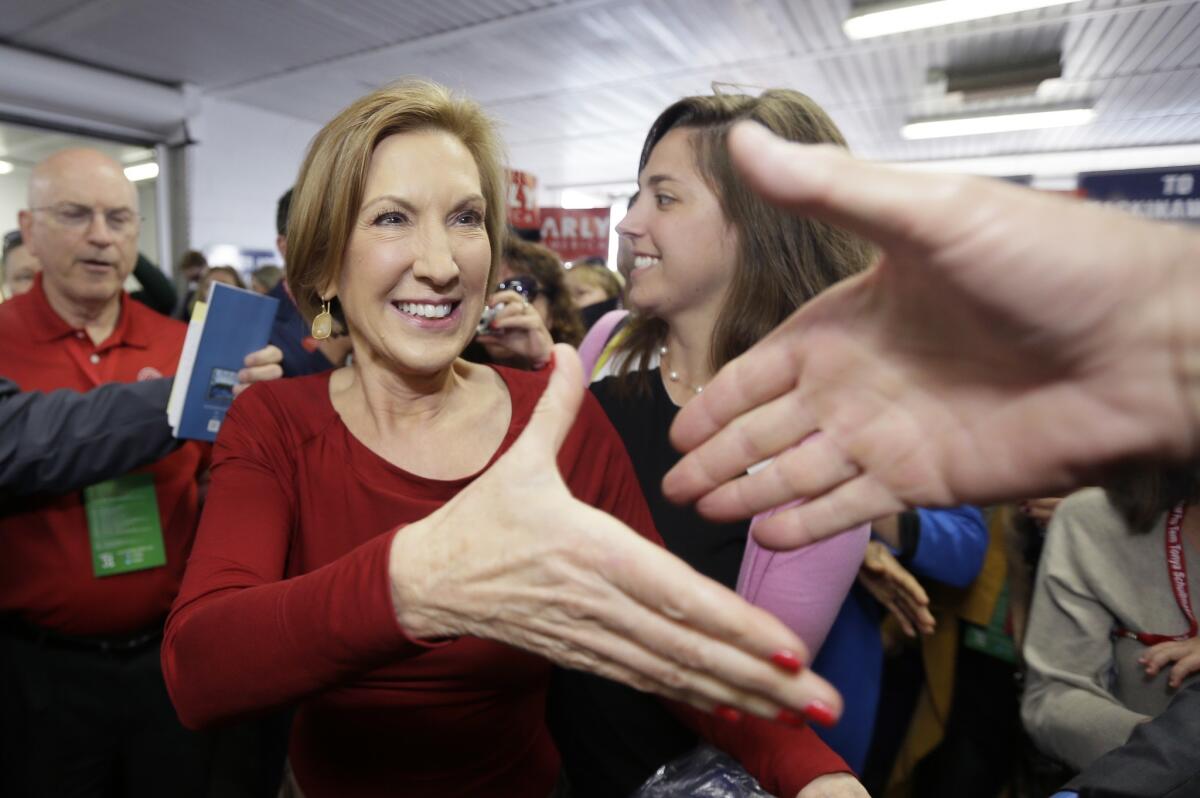Fiorina won debate, but Trump still leads GOP race, polls find

GOP presidential candidate Carly Fiorina, seen here greeting supporters at a Republican event in Michigan on Saturday, got top marks in a new poll for her performance in Wednesday’s debate.
- Share via
Reporting from Washington — Carly Fiorina won the Republican debate Wednesday, but remains significantly behind Donald Trump in the race for the party’s presidential nomination, according to two new surveys released Sunday.
The polls, for NBC News and CNN, showed that Republican voters gave Fiorina and Sen. Marco Rubio of Florida the best marks for their debate performance, but that Trump remained the favorite candidate.
Trump had support of roughly three-in-10 self-identified Republicans and Republican-leaning independents in the NBC poll. Ben Carson, the retired neurosurgeon, was in second place with 14% and Fiorina in third at 11%.
NEWSLETTER: Get the best from our political teams delivered daily.
The CNN/ORC poll also showed Trump in the lead, but found Fiorina jumping into second place. In that survey, Trump was at 24%, Fiorina at 15% and Carson at 14%. Trump and Carson each lost a few points from a CNN/ORC taken in early September, and Fiorina jumped from 3% in that survey. She had been polling higher in some other pre-debate polls.
Although Trump has the most support, he is also the candidate with the highest share of Republicans who view him unfavorably -- 40% have an unfavorable view in the CNN survey, just slightly worse than former Florida Gov. Jeb Bush at 38% and Sen. Rand Paul of Kentucky at 37%.
The surveys are the first of several expected from major polling organizations in the aftermath of Wednesday’s debate. The results are mostly similar to several polls taken before the debate, indicating that although the event drew a huge national television audience, it did not greatly change the shape of the race. Debates usually don’t.
The lineup also confirms the current desire of GOP voters to go with an “outsider” candidate -- all three of the leading candidates have never held public office.
Asked in the NBC poll which qualities were most important to them in a candidate, only 3% of Republican voters said the “right experience” mattered most. But 37% said the most important quality was someone who could “bring about needed change.” Trump supporters especially felt that way, with 46% of them putting the ability to create change at the top of their lists.
Among more traditional political figures, Bush, the onetime front-runner, Rubio and Sen. Ted Cruz of Texas were bunched together with between 7% and 8% support in the NBC poll. None of the other candidates had more than 3% support.
The CNN poll had Rubio at 11%, Bush at 9% and Cruz at 6% with no other candidates more than 4%.
Asked which candidate they expect will win, a question that often has greater ability to predict election results, about one-third of GOP voters in the NBC survey said Trump. Bush came in second with 14% and Carson third with 10%. Trump narrowly led Bush and Fiorina on the question of which candidate seemed most “presidential,” with Trump getting 17% and the other two 14%.
Republican primary voters broadly favor a candidate who would cut off federal money to Planned Parenthood, NBC found, with 61% saying they would be more likely to vote for a candidate who took that position. In the electorate as a whole, that stand is a loser, with 40% saying they would be less likely to vote for such a candidate and 32% saying they would be more likely.
GOP voters differed from voters overall on another big issue -- sending U.S. troops to the Mideast. Among GOP voters, 53% said they would be more likely to vote for a candidate who wants to send U.S. ground troops to Iraq or Syria to fight Islamic militants there. Among the broader electorate, 32% said they would be more likely to vote for such a candidate, while 37% said they would be less likely.
The overall electorate was evenly divided on whether they would be more or less likely to vote for a candidate who favored a pathway to citizenship for people currently in the country illegally. Among GOP voters, a 59% majority said they preferred a candidate who opposes citizenship.
The NBC poll, conducted by Survey Monkey, is one of the new breed of online polls that are challenging traditional telephone surveys in public opinion research. Survey Monkey, best known for its do-it-yourself surveys, has developed an enviable track record for accuracy in its online polls both in the U.S. and Great Britain. It had the only survey, for example, that correctly anticipated the results of Britain’s election this spring.
Unlike telephone polls, which call people at random, online surveys collect a large sample of Americans, then weight the results to match known demographic statistics, such as age, race and gender. The current survey questioned 5,113 adults between Wednesday and Friday, including 2,070 Republicans. The results have an error estimate of +/- 2.9 percentage points for the GOP sample.
The CNN/ORC poll is a traditional telephone survey. It questioned 444 Republican voters Thursday through Saturday and has a margin of error of +/-4.5 percentage points for the GOP sample.
For more on politics and policy, follow @DavidLauter
More to Read
Get the L.A. Times Politics newsletter
Deeply reported insights into legislation, politics and policy from Sacramento, Washington and beyond. In your inbox three times per week.
You may occasionally receive promotional content from the Los Angeles Times.











